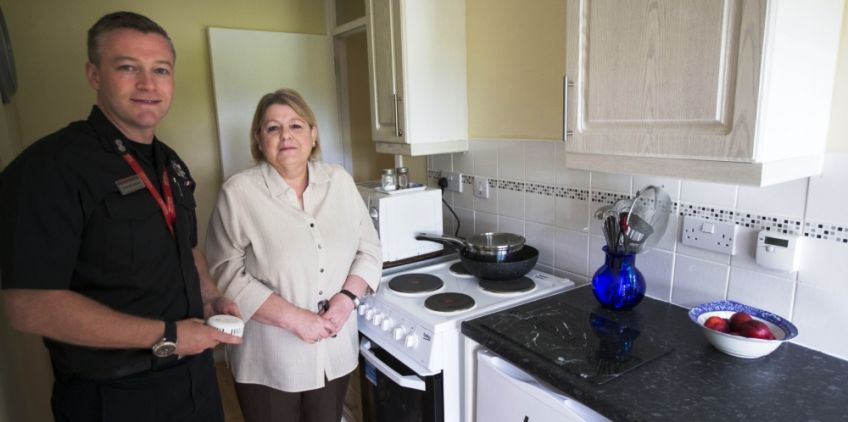Kitchen safety
Did you know more fires start in the kitchen than in any other room?

Keep safe in your kitchen by booking a free home fire safety visit today. It only takes around 20 minutes – and it could save your life.
You'll get safety tips and advice on how to avoid a fire in the kitchen – and what to do if it does. You'll even get free extra smoke alarms if you need them.
Speak to your housing officer or book your free visit by:
- texting ‘FIRE’ to 80800 from your mobile
- calling 0800 0731 999.
Cooking safety
Follow our cooking advice to stay safe in the kitchen:
- make sure your cooker was fitted by a qualified fitter
- keep your oven, cooker and grill clean. Clean up any fat
- keep tea towels, cloths and kitchen paper away from the cooker
- keep fats and oils away from the cooker
- cook with handles turned to the side to avoid spilling
- use a flameless lighter on gas cookers instead of matches or a lighter.
You should never:
- hang or dry clothes or towels on or near the cooker
- leave your cooker, grill or oven on when you go out – even on a timer
- leave electrical wires or cords near the cooker
- keep anything on top of an eye-level grill
- put anything metal in your microwave – even tin foil
- cook after drinking alcohol or taking drugs or if you are feeling tired.
Chip pans and deep-frying
Modern electric deep fat fryers are safer than traditional chip pans because they have a safety switch that cuts them off to stop them overheating and catching fire.
Traditional chip pans are more likely to cause fires. If you do use one, follow this advice:
- only ever fill one third full
- turn the handle to the side – but not over any of the other cooker rings
- fry in small amounts – overfilling could cause spills
- make sure food going in it is dry, not dripping wet or covered in ice.
You should never:
- deep fry when you’ve been drinking alcohol or taking drugs or if you are feeling tired
- leave the pan alone - it only takes a second for a fire to start.
Kitchen appliances
Washing machines, tumble dryers and dishwashers have working parts that heat up and could start a fire if something goes wrong.
Follow our safety advice:
- always switch appliances off at the wall before going to bed or going out
- always plug straight into a wall socket and avoid adaptors for lots of plugs as they can result in electricity overloads
- never leave them running when you’re going out or going to bed.